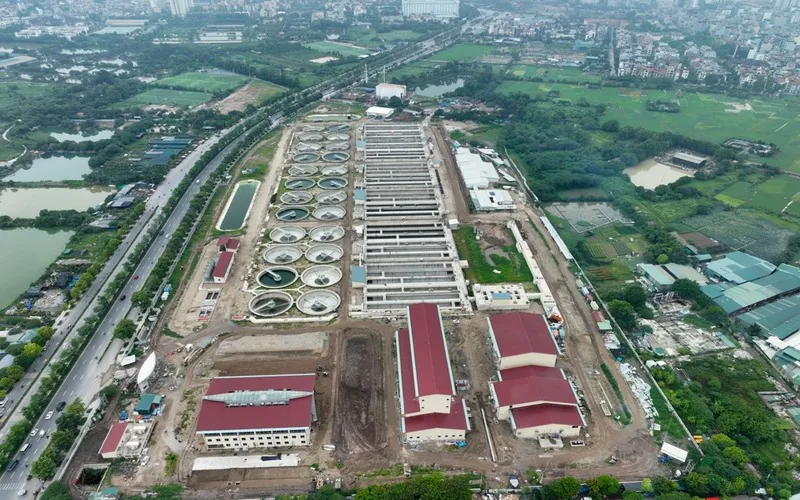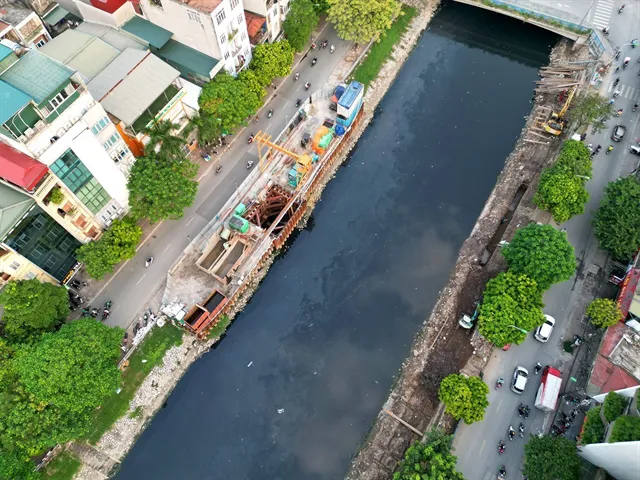Construction accelerated for Hanoi's largest wastewater treatment plant
The major components of the Yen Xa Wastewater Treatment Project have been substantially completed.
Hanoi authorities are pushing for faster progress on the Yen Xa wastewater treatment plant, the largest of its kind in the city, for trial operation in the second quarter of 2024.
Nguyen Anh Son, Deputy Director of the Hanoi Management Board of Investment, Construction Projects on Water Supply, Drainage and Environment, told The Hanoi Times that around 300 people are working on the project to ensure it meets deadlines.
"As of mid-May, Package No.1, the main part of the Yen Xa Wastewater Treatment Plant construction project by Japanese contractor JFE-TSK Joint Venture Company, reached about 97% completion. The construction unit is currently completing internal roads and conducting equipment testing, and trial operation is scheduled for the second quarter of 2024," Son said.
An aerial view of the Yen Xa wastewater treatment plant. Photo: Khanh Huy/The Hanoi Times |
He added that the remaining packages are tasked with the construction of collector sewers. Currently, Package 2, which includes the main sewer by the Japanese contractor TEKKEN Company, is 93% complete. It is expected to be finished before March 2025. For Packages 3 and 4, issues are currently being resolved in order to continue construction.
"We are currently compiling documents to submit to the Ministry of Natural Resources and Environment for discharge permits for trial operation, after which we will apply for permission to operate the plant. The plant is expected to be fully commissioned this year," Son told The Hanoi Times.
The Yen Xa Wastewater Treatment Project, which began construction in Thanh Tri District in 2016 and covers an area of nearly 13.8 hectares, will be able to treat 270,000 cubic meters of wastewater per day. The project has a wastewater collection system along the To Lich and Lu rivers with a total length of more than 52 kilometers.
The Yen Xa wastewater treatment plant is urgently needed for Hanoi's environmental treatment as it would collect and purify wastewater from seven districts, including Ba Dinh, Cau Giay, Thanh Xuan, Dong Da, Hoang Mai, Ha Dong and Thanh Tri. The site is also key to reviving the city's dying To Lich River, which has been heavily polluted for decades.
Secretary of the Hanoi Party Committee Dinh Tien Dung recently asked contractors to speed up construction of the Yen Xa wastewater treatment plant to clean up the once-iconic To Lich River and improve the lives of citizens living along the river.
To ensure the project's progress, Dung has asked ministries and local authorities to facilitate the handover of the site and the underground construction license to investors, contractors and related units. He also asked contractors to carry out the construction simultaneously.
Yen Xa is Hanoi's largest wastewater treatment project, costing VND16.3 trillion (US$700 million), of which 84% is official development assistance (ODA) loans provided by the Japanese government through the Japan International Cooperation Agency (JICA).
Part of the To Lich River on Kim Nguu Street in Hanoi. Photo: VNA |
"The project is also a testimony to the good traditional friendship between Vietnam and Japan over the past 50 years," said Chu Manh Tuan, Deputy Director of the Hanoi Management Board of Investment, Construction Projects on Technical and Agricultural Infrastructure.
He added that once the project is operational, sewage from 150 main canals along the banks of the To Lich River will be collected and treated before being discharged into the river, and a large amount of Hanoi's sewage will be processed.
"As a result, half of Hanoi's urban wastewater will be treated, double the current one-third, which will help revitalize the capital's heavily polluted rivers, especially the To Lich River," Tuan told The Hanoi Times.
"By the end of 2024, we aim to collect all the wastewater currently flowing into the To Lich River and treat it at the plant. After treatment, the wastewater will be discharged back into the To Lich and Nhue rivers in compliance with standards. This will make the rivers cleaner and more sustainable, as desired by the citizens of the capital," Tuan added.
The major elements are largely completed and the teams are putting the finishing touches on the secondary clarifiers and the sewers and other parts. Some clarifiers have been completed and tested. New technology has been used to construct the sewers and tunnels so that nearby structures, traffic and daily activities will not be affected by the project.












